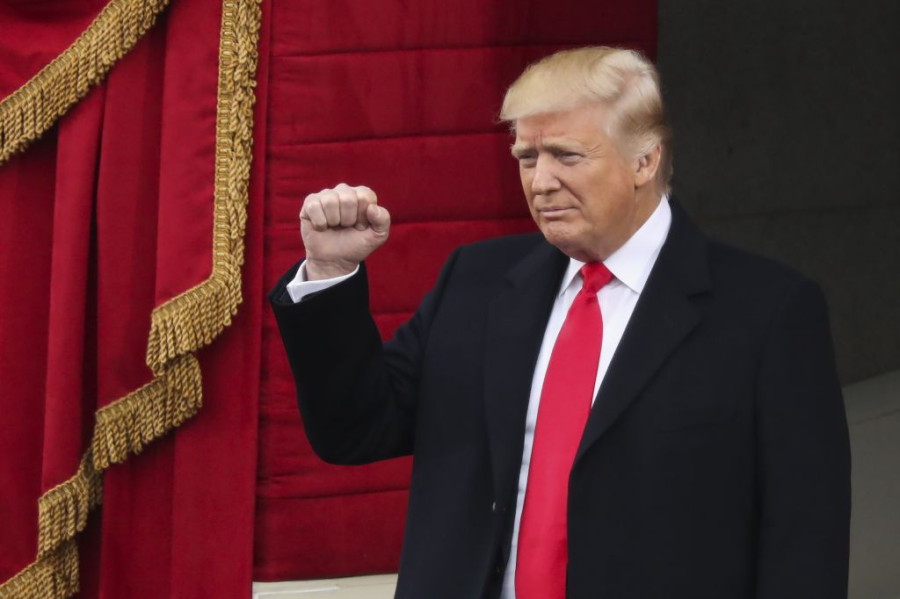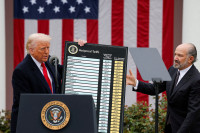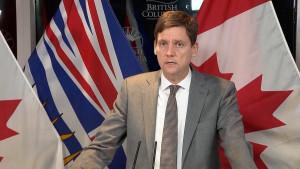World
Fighting terror in Afghanistan challenge for Trump
Afghanistan remains one of the main challenges for the Trump administration with analysts suggesting that the new US President needs to review the strategy of the War on Terror in Afghanistan.
Ians
Afghanistan remains one of the main challenges for the Trump administration with analysts suggesting that the new US President needs to review the strategy of the War on Terror in Afghanistan.
Donald Trump, who was sworn-in the 45th President of the US on January 20, in his maiden yet short speech at the inauguration ceremony, reportedly said: "We will unite the civilised world against radical Islamic terrorism to eradicate it completely from the face of the Earth."
However, he did not mention Afghanistan, where US-coalition forces have been fighting since October 2001 to eliminate Al Qaeda terrorists and the Taliban group, Xinhua news agency reported.
"The War on Terror, initiated by former US President George W. Bush in Afghanistan, and continued by former President Barack Obama would also last during Trump's tenure," renowned analyst General Atiqullah Omarkhil (Retd), formerly of the Afghan National Army, told Xinhua.
Backing his notion, the military expert and political observer said the "US itself doesn't want to end the war in Afghanistan".
He argued that "the US-led coalition forces might have already won the War on Terror when it had more than 150,000-strong multi-national troops in Afghanistan if it fought sincerely".
"The coalition forces overthrew the Al Qaeda-backed Taliban regime within weeks in late 2001 but the 'cat and mouse' war continues," the analyst highlighted.
The former army General expressed doubt over the US resolve in fighting terrorism sincerely in Afghanistan amid Kabul's desires that the new administration in Washington like its predecessors would continue to support the Afghan government in the war against the Taliban and associated groups.
Afghan Presidential Spokesman Haroon Chakhansori recently assumed that since relations between Kabul and Washington are strategic and based on common interests, it stands to reason the new administration would continue to back Afghanistan.
Similarly, Mujib Rahman Rahimi, the spokesman for the Afghan Chief Executive, also in talks with the media last week, accused Pakistan of supporting the Taliban and hoped the new US administration would support the Afghan government in the war against terror.
He hoped that the Trump administration would put pressure on Islamabad to give up backing militants operating in Afghanistan.
Former Afghan President Hamid Karzai also called upon Trump to review Washington's strategy in the War on Terror and pay attention to the terrorists' safe havens in Pakistan.
Afghans mostly accuse Pakistan of backing the Taliban and like-minded groups in fighting in Afghanistan, a claim utterly rebuffed by Islamabad as baseless.
Nevertheless, Omarkhil, as an eminent analyst, brushed aside the demand of Afghan officials from the new US administration as wishful thinking and observed: "The US is not serious in the War on Terror, otherwise, the Taliban militants might already have been diminished."
The war, launched by the US-led coalition forces against the Taliban regime for providing shelter to Al Qaeda leader Osama Bin Laden in October 2001, has claimed thousands of lives in Afghanistan.
"The US-led war in Afghanistan has yet to deliver," observed the analyst.
"Failure in the War on Terror has paved the way for the Islamic State terrorist group to emerge and kill Afghans. The countrymen will continue to suffer at the hands of terrorists in the years ahead," Omarkhil said.
Corroborating the notion, former Afghan diplomat and prominent analyst Ahmad Sayedi said Trump in his speech clearly indicated that he wants everything for his country and cautioned the government to be vigilant and do its best to stand on its own feet.
"With a backdrop of failure in the War on Terror over the past 15 years, Afghanistan will likely continue to remain a challenge for the US in the years ahead," the political expert observed.
The Afghan media has also warned the Trump administration that leaving Afghanistan in the lurch would eventually pave the way for terrorist outfits to regroup and destabilise the region and the world at large.




 12.72°C Kathmandu
12.72°C Kathmandu









.JPG&w=300&height=200)




